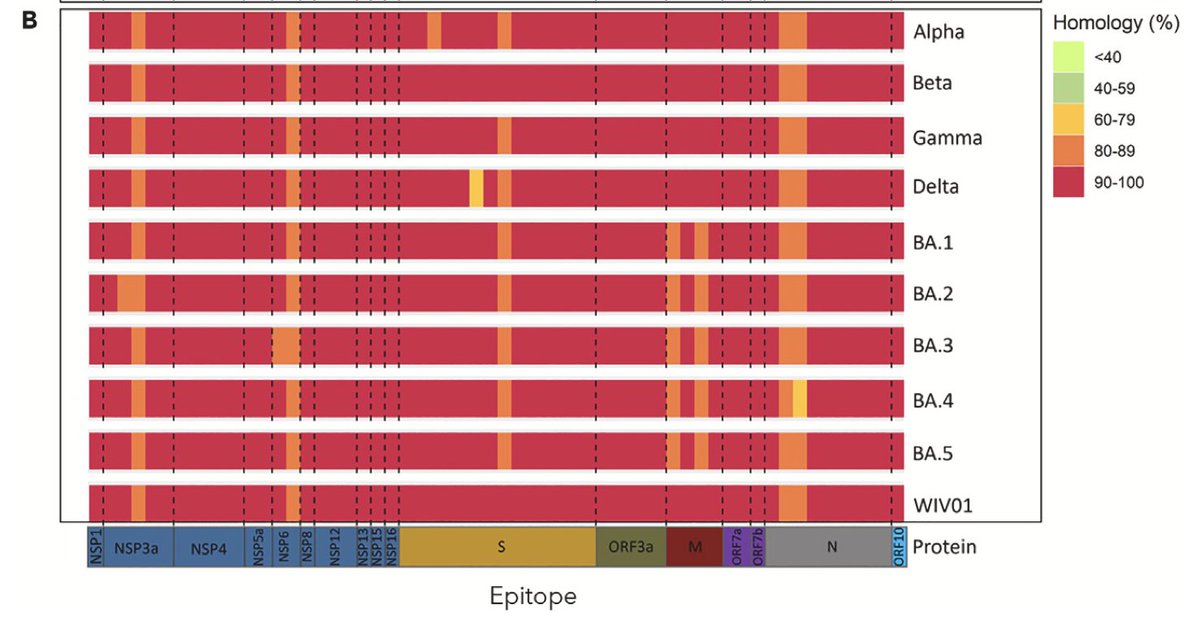Immunity to SARS-CoV-2: Understanding T-Cell Epitopes
Learn about immunity to SARS-CoV-2 and how T-Cell epitopes play a role. Get an in-depth look at the number of epitopes, variability of MHC genes, and conservation of major T-cell epitopes across SC2 variants.

Prof Francois Balloux
Director @UGI_at_UCL. Interest in Infectious disease epidemiology, pathogen genomics and global health Mastodon account: @FBalloux@genomic.social

-
Informative blogpost by Paul Offit on immunity to SARS-CoV-2. Though, one can go a step further. Immune escape from T-cells by any new SARS-CoV-2 variant isn't plausible. The reason is twofold, the number of epitopes and the variability of MHC genes.
— Prof Francois Balloux (@BallouxFrancois) June 20, 2023
1/https://t.co/hwG4WUPLjg -
There are a very large number of regions in the SARS-CoV-2 genome that act as immunodominant T-cell epitopes (ie. are recognised by our immune system). A variant mutated at all of those sites would be a radically different virus (thousands of mutations apart).
— Prof Francois Balloux (@BallouxFrancois) June 20, 2023
2/ -
Omicron avoided recognition by neutralising antibodies, which target a handful of specific regions in the S protein that make direct contact with the host cell. Neutralising Abs preclude attachment of the virus to the host cell receptor (ACE2) by binding to those regions.
— Prof Francois Balloux (@BallouxFrancois) June 20, 2023
3/ -
All neutralising antibody epitopes had been altered in Omicron after it acquired ~30 mutations in the S. Major T-cell epitopes remained unaffected. Below, conservation of major T-cell epitopes across SC2 variants - lower limit for X-recognition: ~60%.
— Prof Francois Balloux (@BallouxFrancois) June 20, 2023
4/https://t.co/iNzd8hnCEE pic.twitter.com/W3AoNbCoj2 -
2. Besides the very large number of different T-cell epitopes, there is another reason why it is near-impossible for a pathogen to evolve escape from T-cell immune recognition.
— Prof Francois Balloux (@BallouxFrancois) June 20, 2023
5/ -
Everyone of us produces roughly the same neutralising antibodies when exposed to the same antigen. So if a virus escapes Jane's neutralising antibodies, it also escapes Mary's and Juan's, and anyone else's.
— Prof Francois Balloux (@BallouxFrancois) June 20, 2023
6/ -
Conversely, everyone's immune system will recognise a different subset of T-cell epitopes. This is a feature rather than a bug of our immune system, which is made possible by the extraordinary variability of our MHC genes that deal with the recognition of self vs. non-self.
— Prof Francois Balloux (@BallouxFrancois) June 20, 2023
7/ -
Every 'escape mutation' against one of the very many T-cell epitopes will only be beneficial for the pathogen in a small subset of the hosts. As such, there's no potential for natural selection to push towards T-cell immune escape; there's nowhere for the pathogen to go.
— Prof Francois Balloux (@BallouxFrancois) June 20, 2023
8/ -
T-cell immunity (generally) doesn't protect from (re-)infection. That's the job of neutralising Abs in circulation in the blood. Though, what it does is to protect against severe disease and death, and it does so for a long time. Memory T-cells persist for decades.
— Prof Francois Balloux (@BallouxFrancois) June 20, 2023
9/ -
Everyone please say "thank you" to memory T-cells for the direction of travel in global Covid mortality patterns ...
— Prof Francois Balloux (@BallouxFrancois) June 20, 2023
10/ pic.twitter.com/b69Jocmvms
